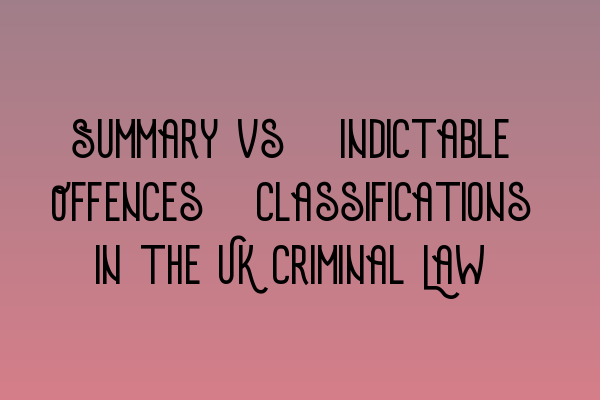Summary vs. Indictable Offences: Classifications in the UK Criminal Law
In the UK criminal legal system, offences are divided into two main categories: summary offences and indictable offences. These categories determine the process by which the offences are brought to court and the severity of the potential punishments. Understanding the distinction between summary and indictable offences is essential for anyone involved in criminal law, whether as a legal professional or an individual facing criminal charges.
Summary Offences
Summary offences, also known as minor offences, are less serious criminal offenses that are generally heard in the Magistrates’ Court. These offences are usually heard by a single magistrate or a panel of magistrates, without a jury. Summary offences cover a wide range of offenses, including but not limited to petty theft, public order offenses, and minor traffic offenses.
The key characteristics of summary offences are that they are less serious in nature and carry a maximum punishment of 6 months imprisonment and/or fines of up to £5,000. As these offences are considered less severe, they are dealt with summarily, without the need for a formal indictment or jury trial. However, in some cases, certain summary offenses can be elevated to the Crown Court if they are seen as sufficiently serious.
One example of a summary offence is petty theft. This occurs when someone steals or takes an item of low value without using force or threats. Petty theft is considered a summary offence because of its relatively low severity compared to more serious criminal acts like robbery or burglary.
If you are preparing for the SQE 1 exam, it is important to familiarize yourself with the different types of criminal offences and their classifications. You can practice your knowledge by taking the SQE 1 Practice Exam Questions to test your understanding of summary offences.
Indictable Offences
Indictable offences, also known as serious offenses, are more severe criminal offences that are typically heard in the Crown Court. These offences are usually more complex and carry higher potential sentences, including imprisonment for over 6 months and, in some cases, life imprisonment.
Unlike summary offences, indictable offences require a formal indictment, which is a written statement outlining the charges against the accused. The indictment is presented to the court during a preliminary hearing to determine whether the case should proceed to trial.
Indictable offences can be further classified into two subcategories: indictable-only offences and either-way offences.
Indictable-only offences are those that can only be tried in the Crown Court, such as murder, manslaughter, and drug trafficking. These offences are considered the most serious and carry the highest penalties upon conviction.
Either-way offences, as the name suggests, can be tried either in the Magistrates’ Court or the Crown Court, depending on their severity and other circumstances. Examples of either-way offences include theft and assault causing actual bodily harm. The decision on whether to prosecute an either-way offence in the Magistrates’ Court or the Crown Court is usually made during a “mode of trial” hearing, where both the prosecution and defense present their arguments.
If you are preparing for your SQE 1 or SQE 2 exams, taking SQE 1 Practice Mocks FLK1 FLK2 and enrolling in SQE 2 Preparation Courses can greatly enhance your understanding and knowledge of criminal law and practice techniques.
Conclusion
Understanding the classifications of offences in the UK criminal law system is crucial for legal professionals and individuals involved in criminal matters. Summary offences are less serious offenses that are heard in the Magistrates’ Court, with a maximum punishment of 6 months imprisonment and/or fines. In contrast, indictable offences are more severe and are usually tried in the Crown Court, with the potential for higher sentences.
Whether you are preparing for the SQE 1 or SQE 2 exams, it is essential to have a comprehensive understanding of summary and indictable offences. Taking advantage of SQE 1 and SQE 2 Preparation Courses can help you develop your knowledge and skills in criminal law. Keep an eye on the SRA SQE Exam Dates to ensure you are well-prepared and ready for success.
